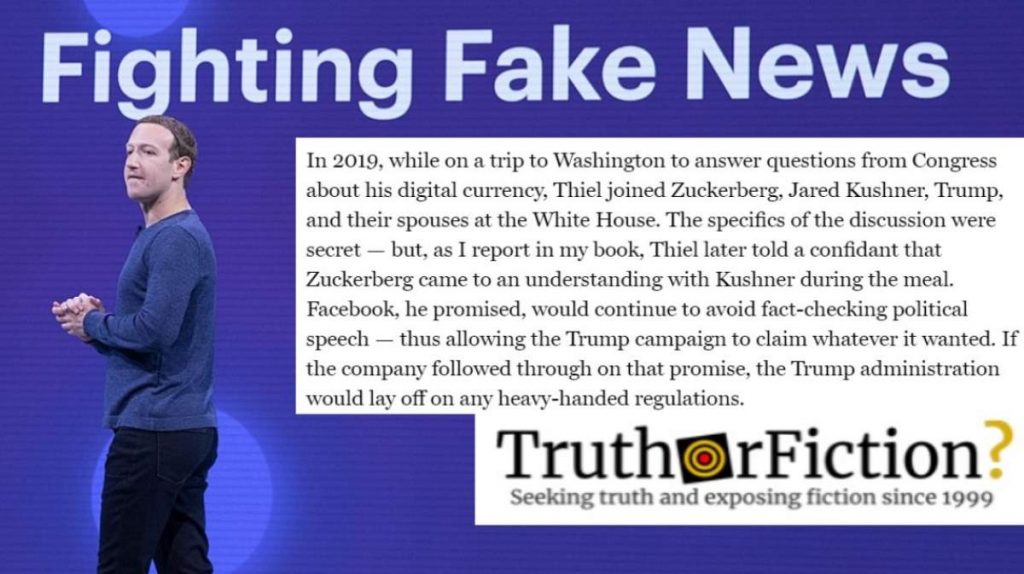A new biography of right-wing tech mogul Peter Thiel claims that, according to him, Facebook chief executive officer Mark Zuckerberg struck a deal allowing Donald Trump and his allies to spread disinformation in exchange for a lack of federal oversight.
The claim was first published in Chafin’s book The Contrarian, excerpts of which were adapted into an article in New York magazine on September 20 2021. Chafin describes Thiel as the Silicon Valley personality that “young aspirants and millennial moguls most seek to flatter and to emulate.”
Zuckerberg, in turn, is described as a pet project of sorts for Thiel; “Thiel ensured that Mark Zuckerberg would be [Facebook’s] absolute dictator,” Chafin wrote.
Chafin reported that in October 2019, Thiel — who is also a highly influential Facebook board member — was invited to a gathering at the White House alongside not just Zuckerberg and then-United States President Donald Trump, but Trump’s son-in-law and “senior advisor,” Jared Kushner. According to Chafin:
Thiel later told a confidant that Zuckerberg came to an understanding with Kushner during the meal. Facebook, he promised, would continue to avoid fact-checking political speech — thus allowing the Trump campaign to claim whatever it wanted. If the company followed through on that promise, the Trump administration would lay off on any heavy-handed regulations.
After the dinner, Zuckerberg took a hands-off approach to conservative sites. In late October, after he detailed the policy in a speech at Georgetown, Facebook launched a news app that showcased what the company called “deeply reported and well-sourced” outlets. Among the list of recommended publications was Breitbart, Steve Bannon’s site, even though it had promoted itself as allied with the alt-right and had once included a section dedicated to “Black crime.” Facebook also seemed to go out of its way to help the Daily Wire, a younger, hipper version of Breitbart that would become one of the biggest publishers on the platform. Facebook had long seen itself as a government unto itself; now, thanks to the understanding brokered by Thiel, the site would push what the Thiel confidant called “state-sanctioned conservatism.”
The dinner took place a day before Zuckerberg defended the “hands-off approach” while testifying to the House Financial Services Committee. In that hearing, Rep. Alexandria Ocasio-Cortez asked Zuckerberg, “So you won’t take down lies or you will take down lies?”
Zuckerberg replied, “In a democracy, I believe that people should be able to see for themselves what politicians that they may or may not vote for are saying and judge their character for themselves.”
Facebook spokesperson Andy Stone has denied the claim of a quid-pro-quo between the company and the Trump administration, saying that Facebook had already been exempting political figures from fact-checking scrutiny since September 2018.
In denying the book’s claim, Stone also cited a paragraph from a Washington Post story on the company’s policy. As researcher Jason Kint noted in response, Stone did not link to the story itself, which mentioned that the platform had rejected a request from then-presidential candidate Joe Biden’s campaign to remove an ad built on disinformation:
The ad claimed that Biden had used the threat of withholding $1 billion to Ukraine to quash an investigation of a company for which his son was a board member — even though the claim has been repeatedly labeled as untrue by news organizations. In response, Facebook said that “direct speech” by politicians was not covered by the fact-checking process that Facebook has put in place in recent years.
Kint also pointed out that by the time of the White House dinner, more than 250 Facebook workers had also sent Zuckerberg and other executives a letter saying that they opposed the pass on political disinformation. As the New York Times reported in October 2019:
Facebook’s position on political advertising is “a threat to what FB stands for,” the employees wrote in the letter, which was obtained by The New York Times. “We strongly object to this policy as it stands.”
For the past two weeks, the text of the letter has been publicly visible on Facebook Workplace, a software program that the Silicon Valley company uses to communicate internally.
This story came on the heels of more than a week of deeply revealing and damaging Wall Street Journal reports about Facebook and its business practices in its series, “The Facebook Files.”

